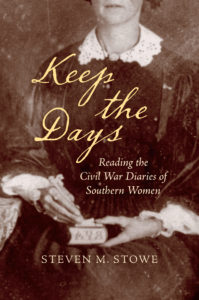Steven M. Stowe: Was Love Trivial in the Civil War?
 Today we welcome a guest post from Steven M. Stowe, author of Keep the Days: Reading the Civil War Diaries of Southern Women, just published by UNC Press.
Today we welcome a guest post from Steven M. Stowe, author of Keep the Days: Reading the Civil War Diaries of Southern Women, just published by UNC Press.
Americans wrote fiercely during the Civil War. War surprised, devastated, and opened up imagination, taking hold of Americans’ words as well as their homes and families. The personal diary—wildly ragged yet rooted in day following day—was one place Americans wrote their war. Diaries, then, have become one of the best-known, most-used sources for exploring the life of the mind in a war-torn place and time. Delving into several familiar wartime diaries kept by women of the southern slave-owning class, Steven Stowe recaptures their motivations to keep the days close even as war tore apart the brutal system of slavery that had benefited them. Whether the diarists recorded thoughts about themselves, their opinions about men, or their observations about slavery, race, and warfare, Stowe shows how these women, by writing the immediate moment, found meaning in a changing world.
Keep the Days is now available in both print and ebook editions.
###
Was Love Trivial in the Civil War?
Reading the Civil War diary of Emma LeConte, a young, well-to-do white woman in Columbia, S.C., awaiting the arrival of Gen. William Sherman’s army in January 1865, you suddenly hear a new voice, set off by parentheses. It turns out to be the voice of a much older LeConte, who tells you that she is at this moment re-copying her diary in case others might read it. Copying it and editing it: she’s removing her emotional “speculations” about religious faith and the state of her youthful soul. She’s embarrassed by her 17-year-old self and a little bored by her rambling, dark-night-of-the-soul thoughts. So out they go. We might think of diaries as texts where private emotion finds a home, but LeConte’s editorial knife shows us that war diaries may be a special case. What does this mean for how we read such diaries?
Consider romantic love. Even more than the emotions surrounding religion, the emotions of love flowed easily into young southern women’s war diaries. War transformed local men and brought new ones—exciting men dressed to the nines and talking heroism. The chances for love became brilliant and scattershot, a match for war. Even when war’s destruction set in, many diarists wrote their hope that both men and love would counter it. In one way or another, they wrote a great deal about love. Then, years later, thinking that others might want to read their wartime pages, they decided to lower love’s volume. Never mind that the embrace of love and war is the stuff of world literature, the women saw their love talk as not fitting into the Civil War’s deadly seriousness. Love seemed callous and trivial. Eliza Andrews prepared her war diary for publication in 1908 and says straight-out that she’s removing “silly flirtations.” So did Emma LeConte. Emma Holmes and Sarah Morgan thought they should do the same before anyone saw their embarrassing lines, though it seems they didn’t do much of it.
A lot of post-war editors joined in, condensing words of love, or just tossing them out. Religious emotion takes a hit, too. Time had passed, and such emotions did not seem to stack up well against war’s big, serious game. Maybe emotion seemed timeless compared to the firmly chronological war, though of course it was very much a part of its time. Sarah Morgan’s editor-son deleted most of her “too personal” passages about men and love from her diary when he had it published after her death. Anna Green’s academic editor said bluntly that he found the emotional 18-year-old “pathetically irresponsible” and went about cutting many of Green’s thoughts about love, including pages that she had shared with her lover, the two of them making love in dialogue.
If instead of cutting love we read diaries for their love talk, we see the power love had in wartime to offset war’s doom. Sure, love was embarrassing, but diaries show it was far from trivial. Love’s power, its hope put into words, was as real as anything else in the lives of diarists as they wrote war’s collision with their days. Only our distance from their wartime, and the understandable but narrow vision of war as about nations, peoples, and wide-frame change over time, has pushed love from its place. Love did survive—first the war, then the editing—in many women’s diaries. When it survives, love talk does exactly what diaries do well—call up the scale of life-as-lived, its store of emotion and its language, and the imagination of war-torn people facing each day and writing it.
###
Steven M. Stowe is professor emeritus of history at Indiana University, Bloomington. You can read his earlier UNC Press Blog post here.

You must be logged in to post a comment.